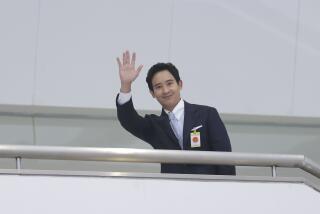Thai Vote Shapes Up as Referendum on Steps Toward Greater Democracy
BANGKOK, Thailand — After enjoying three years of political stability and steady but unspectacular economic recovery, Thailand’s 44 million voters will elect a new government today--and in the process will pass judgment on democratic reforms that have earned the kingdom widespread international praise.
If the polls are correct, Prime Minister Chuan Leekpai’s Democrat Party stands little chance of retaining power. Many Thais, particularly in rural areas, believe that the recovery has passed them by. In the cities, others criticize the gentlemanly Chuan for selling state assets to foreigners and being too accommodating to Washington and the unpopular International Monetary Fund.
The beneficiary of the Thais’ disillusionment is apt to be Thaksin Shinawatra, 51, a former police officer who parlayed a bank loan into a telecommunications conglomerate and is one of country’s richest men. His 2-year-old Thais Love Thais Party could win 200 of the 500 seats in the lower house of parliament, polls indicate, enabling the U.S.-educated Thaksin to stitch together a governing coalition from the 39 parties in the election.
Regardless of who wins, the only country in Southeast Asia never to be colonized is unlikely to make dramatic shifts. Western political analysts believe that Thailand will continue to pursue democratic reforms, a role in globalization and its long-standing friendship with the United States, the largest market for Thai exports, which range from shrimp and agricultural products to electronics.
For Southeast Asia, a region increasingly beset by political turmoil, Thailand’s election is being scrutinized as a trial run for democracy. This is the first vote for the lower house held under the 1997 “good governance” constitution, which was designed to stamp out corruption and patronage and break the hold of provincial barons on politics.
It is also the first in which some of the world’s toughest standards for electoral honesty and against graft have been drawn up. And it is the first since the formation of the Election Commission, an independent five-member body that can disqualify candidates for misdeeds and can order reelections in constituencies where vote-buying or other improprieties are found.
Thaksin himself, in fact, is already in its shadow. The commission indicted him Dec. 26 for failing to declare all his assets as required--shares worth $232 million had been transferred to two of his maids and a driver. He resisted calls to withdraw from the race and appealed, saying he was guilty of only an oversight.
If the 15-judge Constitutional Court rejects his appeal, he could be barred from politics for five years and have to resign from any political position, including the premiership. The appeals process will take several months and could plunge Thailand into a period of political uncertainty, resulting in a loss of investor and consumer confidence.
The spirited campaign has galvanized Thailand for two months. Chuan, 62, has focused on the kingdom’s progress during his three years in office and on the need for patience. Thaksin has countered with a platform of benefits, not policy: $23,000 for each of Thailand’s 80,000 villages, a three-year debt moratorium for all farmers, and health insurance in which any treatment would be available for 75 cents.
Chuan--whose declared assets are only $73,000--remains respected for his honesty and promotion of stability in a country that, since abolishing the absolute monarchy in 1932, has had 16 successful military coups, 17 constitutions and 23 prime ministers.
His is the first government to serve out its full parliamentary term in 68 years, and he kept the same respected economic team in place during his entire administration, in contrast to the previous government, which had three finance ministers in 11 months.
Although the recovery remains a fragile one, the economy grew 4.5% last year. Retail sales, construction and real estate prices are picking up. Visa applications at the U.S. Embassy have returned to pre-1997 levels, indicating that many Thais have money to travel. Tourism in Thailand reached record levels in 2000.
“There are political problems in the region--Indonesia, the Philippines, Laos, even Malaysia--these days,” said Kurt Wachtveitl, general manager of the 125-year-old Oriental hotel. “But in three years under Chuan, I haven’t heard a single negative word about Thailand in the international press. That’s what brings millions of tourists. The world perceives Thailand as a safe, stable country.”
Under Thailand’s new electoral laws, all members of parliament must have college degrees, voting is compulsory, limits are placed on campaign spending, and the Election Commission, backed by 1,200 police investigators, needs only “credible” evidence of impropriety to disqualify a candidate. Some winners of today’s election are likely to be barred after complaints are examined during the next 30 days.
But corruption remains so endemic that 79% of local and foreign businesspeople surveyed by the Thai Chamber of Commerce last summer said bribing civil servants was necessary to obtain government services.
And vote-buying was widespread in the recent campaign, with entire villages awash with gifts of cash, whiskey, vegetable oil and sacks of rice. The Thai Farmers Research Center estimated that the election would generate a “cash flow” of $65 million, much of it illegal.
“Things improved in the campaign, but they’re still far from perfect,” said Gothom Arya, a member of the Election Commission. “A lot of voter mistrust in the system remains. But the more we clean up the system, the more trust we will build up.”
More to Read
Sign up for Essential California
The most important California stories and recommendations in your inbox every morning.
You may occasionally receive promotional content from the Los Angeles Times.









